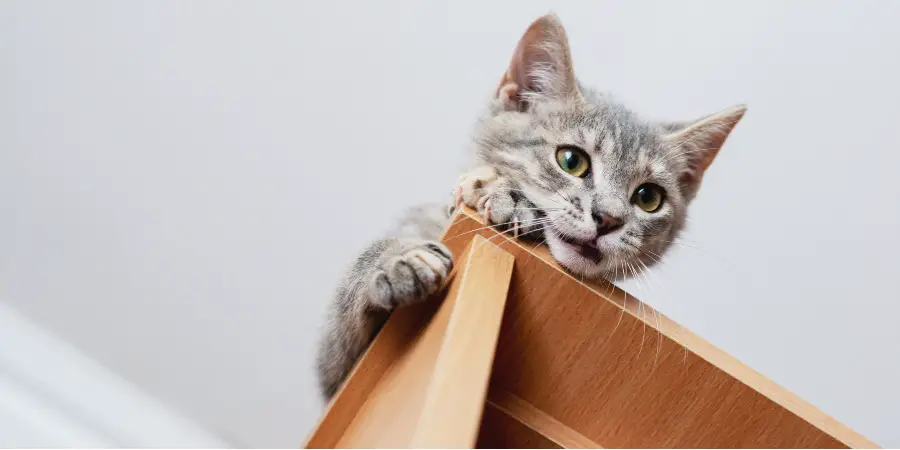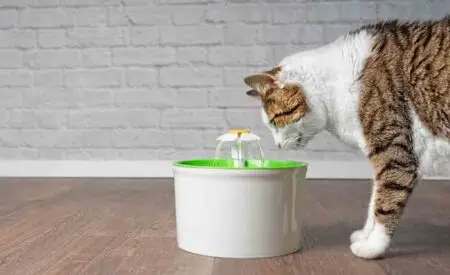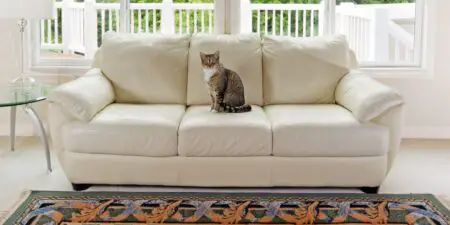I know how frustrating it can be when your cat decides to pee on your furniture. It just ruins everything! Sadly, dealing with this issue is about more than just yelling “no” at your pet or spraying him down with water. Cats are notoriously difficult animals to train, so you’ll need an entirely different approach if you want to get through to him successfully.
That’s why we’ve put together this post all about how to stop cats from peeing on furniture (and other sneaky places that they like). To do that, you will first need to understand why cats are attracted to your furniture in the first place.
Why Do Cats Pee on Furniture?
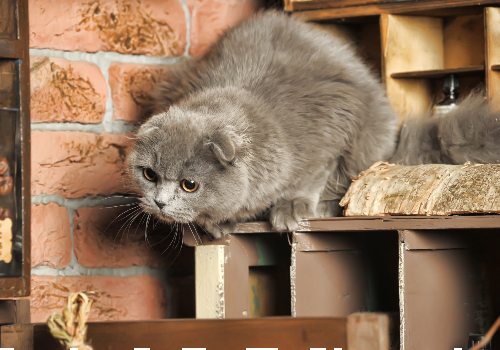
Over the years, our pets’ habits have evolved from being useless to things we’re only mildly annoyed by. And it’s no different for cats and their infamous unfortunate habit of urinating on your stuff.
1. Medical Issues
A stray cat will find its way into your house and start using your furniture as his toilet at one time or another. It could be due to a host of different reasons, from illness to malnutrition, making it difficult for you to determine exactly what’s wrong with him.
2. Marking Territory
Although pet owners are constantly cleaning, re-arranging furniture, or moving things around in an attempt to discourage their feline from peeing on anything at all, he still does it. Why? It’s all about marking territory. Cats have an innate need to mark the areas they deem theirs, and by spraying odour into your home, he’s informing other cats that this is his place.
3. Stress
Many cats suffer from stress and anxiety, especially if they’re suffering from a problem that they need to get rid of. So, while they may not be peeing in your house because they want to, it’s more likely that there’s a medical issue causing the problem.
4. Changes in the Litter Box
The cat litter box can be a very common spot for cats to urinate in your house. For example, if there’s a change, such as the litter changing from clay to crystal, your cat may begin using the newer type of litter as a scent marking mechanism. It is especially true if he was also on medication at the change.
5. Mating Behavior
Cats will also spray (and pee) on your furniture as a form of courtship or mating behavior. When the temperature rises, it’s not uncommon for a cat to spray more often. Any time there is an increase in hormone production, such as when your pet is about to be spayed or neutered, that’s when the peeing becomes most prevalent.
How to Stop Cats from Peeing on Furniture
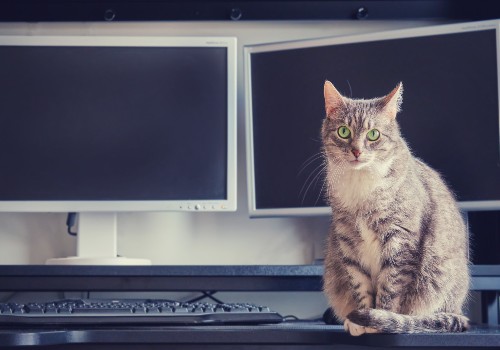
It’s time to learn how to stop this behavior, so let’s get started. Of course, there are many different things that you can do, but let’s face it, sometimes cats won’t listen no matter how much you try. So, we recommend that you start with this simple step.
1. Clean Cat Pee Using Enzymatic Cleaners
Cat pee is typically made up of two things: the urine itself and a neutralizing chemical called urea. When cats pee, they’re aiming for a small target, not a huge area that has no meaning to them at all. It means that the urine will stay concentrated on your furniture, and the smell will keep lingering for quite some time.
While you could go about covering your furniture in plastic and using harsh chemicals to get rid of the smell, there’s something much more natural that you can try first. Just combine 1/4 cup of vinegar with water and use a rag to wipe down all affected areas. The vinegar should eliminate the odours and neutralize any remaining cat pee traces.
2. Use Essential Oils to Deter Cats From Peeing Outside the Litter Box
Essential oils have been used for centuries to treat various ailments, from minor wounds to more significant issues like stress and anxiety. While many pet owners believe that introducing essential oils into their pets’ lives is unnecessary, they can reap many benefits.
Among them is a powerful reaction when it comes to deterring cats from peeing on your furniture. You can try peppermint, for instance, but there are a lot of different essential oils out there. So you may want to do a little bit of research before you make your final decision.
3. Place Reflective Objects Around Your Home
[amazon bestseller=”reflective tape”]
If your cat is marking his territory with his urine, he’s not just placing urine marks on your furniture. His urine also leaves a scent signature for the other cats, which will help them tell where all the good places in your house are. So you’ll want to make it very clear that this is not a good place to be!
It is where reflective objects come in handy. While some may believe that putting reflective tape on your furniture will turn your home into an impenetrable trap, if you have a target of cat pee on your furniture, then this will be more than sufficient. You can easily find reflective tape at the hardware store or online, so start decorating!
4. Move the Litter Box to a Specific Spot
[amazon bestseller=”cat litter box”]
If your cat is peeing on your furniture because of a strange change in litter box location, then you’ll want to fix that right away. Cats prefer privacy when going to the bathroom, so try moving the litter box into a corner where he will feel more comfortable using his toilet.
It can be difficult because cats are very territorial and may not want to use a different area of your house for their bathroom needs, but there are lots of other locations that you can try. It’s best to ask the advice of a veterinarian when it comes to this, but make sure that you do your research before you switch locations.
5. Talk to Your Veterinarian if Things Don’t Improve
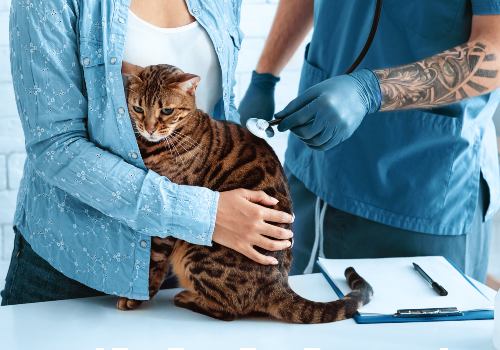
If you’ve tried everything in this guide and your cat is still peeing on your furniture, then it may be time to talk to your veterinarian. They could recommend that you try a different type of litter, for example, or a new way of covering the smell from their urine.
The bottom line is that cats are creatures of habit, and if something in the household has changed (even if it’s just been placed in a new location), he may not know how to adapt to his routine. If the cat is peeing because of stress, you may need to ask your vet about a medication that could help. Of course, if it’s simply a case of an older cat with weak bladder muscles, then you’ll want to try and make sure that he gets enough water every day.
6. Play With Your Cat Around Her Box
When you’re planning on getting a cat, it’s important to keep her happy. And just like human beings, cats will have different needs when it comes to playing. Your kitten might enjoy chasing you around the house and playing with toys, but your older cat may prefer to play in his litter box.
If you’re not sure about how your cat wants to play, then don’t be afraid to spend some time finding out what she enjoys doing. You can do many things with your cat, and even just spending some time with her will increase her happiness.
7. Trim Long Hair Around Hind Quarters
Cats love to play on furniture that’s around their hindquarters, and long hair can easily get caught in those areas. It is why you’ll want to trim her long hair as soon as possible and make sure that she doesn’t have a lot of hair getting in the way when she sleeps.
If your cat has recently had kittens, it may be too late for her to get rid of some of the hair on her body. But you can get rid of any excess fur with regular brushing. Just remember to make it fun for her so that she’ll enjoy grooming time.
8. Apply Double Sided Sticky Tape to Furniture
[amazon bestseller=”Double Sided Sticky Tape”]
Cats like to scratch on things, and cats love to dig. And if your cat is scratching on your furniture, then she’s not just drawing attention to where she likes to dig but also leaving a scent for other cats in the area. Because of this, you’ll want to take action by applying double-sided tape everywhere she scratches.
It will keep her from damaging your furniture and will discourage her from scratching around at all. Just be careful not to apply too much tape because this could stick to her fur and skin. Cats don’t enjoy pain when scratching on things, so you want to make sure that the surfaces are very comfortable.
9. Light up Dark Spaces That Your Cat has Started to Urinate On
Cats are very territorial creatures, and this can be a big problem when they start peeing on things that don’t belong to them. If your cat is starting to pee in the wrong places, you’ll want to find out why it’s taking her so long to come back to its usual territory.
First of all, talk with your veterinarian if this is a problem that they’ve encountered in the past. You’ll want to talk about toilet training, for example, and whether you should be keeping the litter box in a different part of the house. But there are also several things that you’ll want to keep in mind.
Conclusion
Cats are very territorial creatures, and this means that your cat will do everything it can to make sure that it’s not sharing its territory with others. When your cat is peeing on your furniture, he may be trying to keep you out of his territory. So if you want to get rid of the smell from his urine or his spray, you should find ways to make him feel comfortable in your home.
How to Stop Cats from Peeing on Furniture (Video)
"In ancient times cats were worshipped as gods; they have not forgotten this."
-- Terry Pratchett

